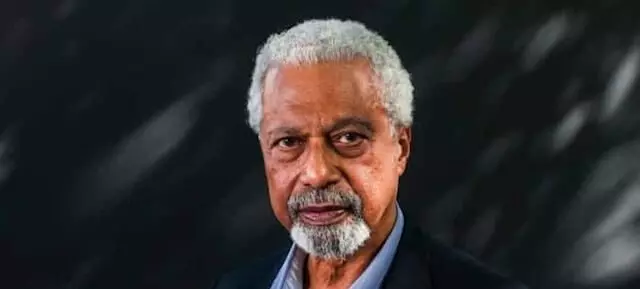
Tanzanian novelist Abdulrazak Gurnah wins 2021 Nobel Literature Prize
text_fieldsTanzanian novelist Abdulrazak Gurnah won the 2021 Nobel Prize in literature for his "uncompromising and compassionate penetration of the effects of colonialism and the fate of the refugees in the gulf between cultures and continents."
The Nobel Prize comes with a medal and a prize sum of 10 million Swedish kronor (about $1.1 million).
The Swedish Academy said Mr. Gurnah's "novels recoil from stereotypical descriptions and open our gaze to a culturally diversified East Africa unfamiliar to many in other parts of the world."
Based in Britain, Gurnah is the first African writer to win the award since the Zimbabwean Doris Lessing in 2007, and only the second writer of colour from sub-Saharan Africa, after Nigeria's Wole Soyinka, who won in 1986.
Born in Zanzibar in 1948, Gurnah came to Britain in the 1960s as a refugee. Being of Arab origin, he was forced to flee his birthplace during the revolution of 1964 and only returned in 1984 in time to visit his dying father. Until his retirement, he was a full-time professor of English and postcolonial literatures at the University of Kent in Canterbury.
He has published 10 novels as well as a number of short stories.
He is best known for his 1994 breakthrough novel Paradise, set in colonial East Africa during World War I, which was shortlisted for the Booker Prize for Fiction.
He began to write as a 21-year-old refugee in England, choosing to write in English, although Swahili is his first language. His first novel, Memory of Departure, was published in 1987.
Gurnah's fourth novel, Paradise, was shortlisted for the Booker prize in 1994, and his sixth, By the Sea, was longlisted in 2001. Olsson said that Paradise "has obvious reference to Joseph Conrad in its portrayal of the innocent young hero Yusuf's journey to the heart of darkness".
Gurnah, who was in the kitchen when he was informed of his win, said that he believed it was a wind-up.
"I am honoured to be awarded this prize and to join the writers who have preceded me on this list. It is overwhelming and I am so proud."
His longtime editor, Alexandra Pringle at Bloomsbury, said Gurnah's win was "most deserved" for a writer who has not previously received due recognition.
Pringle said Gurnah is as important a writer as Chinua Achebe. "His writing is particularly beautiful and grave and also humorous and kind and sensitive. He's an extraordinary writer writing about really important things."
Afterlives, published last year, is set against the backdrop of German rule in east Africa in the early 20th century. It tells the story of a young boy sold to German colonial troops. The novel was shortlisted for the 2021 Orwell prize for political fiction and longlisted for the Walter Scott prize for historical fiction.
The Nobel winner is chosen by the 18 members of the Swedish Academy – an august and mysterious organisation that has made efforts to become more transparent after it was hit by a sexual abuse and financial misconduct scandal in 2017.























